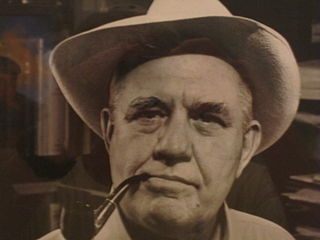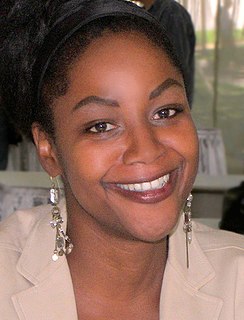Related Research Articles

James Frank Dobie was an American folklorist, writer, and newspaper columnist best known for his many books depicting the richness and traditions of life in rural Texas during the days of the open range. As a public figure, he was known in his lifetime for his outspoken liberal views against Texas state politics, and carried out a long, personal war against what he saw as braggart Texans, religious prejudice, restraints on individual liberty, and the mechanized world's assault on the human spirit. He was instrumental in saving the Texas Longhorn breed of cattle from extinction.

Harryette Mullen, Professor of English at University of California, Los Angeles, is an American poet, short story writer, and literary scholar.
Craig Arnold was an American poet and professor. His first book of poems, Shells (1999), was selected by W. S. Merwin for the Yale Series of Younger Poets. His many honors include the 2005 Joseph Brodsky Rome Prize Fellowship in literature, The Amy Lowell Poetry Traveling Fellowship, an Alfred Hodder Fellowship, a Fulbright Fellowship, an NEA fellowship, and a MacDowell Fellowship.
Allen Wier, is an American writer and a professor. He was the Watkins Endowed Visiting Writer at Murray State University from 2016 until 2020; he is Professor Emeritus having taught at the University of Tennessee from 1994 until 2015, and the University of Alabama from 1980 to 1994. and Hollins College from 1975 to 1980 and Carnegie-Mellon University from 1974 to 1975. He taught in the University of New Orleans summer writing workshop in Edinburgh, Scotland in Summer of 2013. He was visiting writer at the University of Texas in 1983 and at Florida International University 1984-1985.

Zuwena "ZZ" Packer is an American writer of short fiction.
Laura Furman is an American author whose work has appeared in The New Yorker,Mirabella,Ploughshares, Southwest Review, Yale Review, and elsewhere'.

Cyrus Cassells is an American poet and professor.

Thomas Calloway "Tom" Lea III was an American muralist, illustrator, artist, war correspondent, novelist, and historian.
Roberta Fernández is a Tejana novelist, scholar, critic and arts advocate. She is known for her novel Intaglio, and for her work editing several award-winning women writers. She was a professor in Romance Languages & Literatures and Women's Studies at the University of Georgia.

Dagoberto Gilb is an American writer who writes extensively about the American Southwest.

Debra Monroe is an American novelist, short story writer, poet, and essayist. She has written six books, including two story collections, two novels, and two memoirs. Monroe has been twice nominated for the National Book Award, is a winner of the prestigious Flannery O'Connor Award for Short Fiction, and was cited on several "10 Best Books" lists for her nationally-acclaimed memoir, On the Outskirts of Normal: Forging a Family Against the Grain.
The Texas Institute of Letters is a non-profit Honor Society founded by William Harvey Vann in 1936 to celebrate Texas literature and to recognize distinctive literary achievement. The TIL’s elected membership consists of the state’s most respected writers of fiction, nonfiction, poetry, journalism, and scholarship. Induction into the TIL is based on literary accomplishments. Application for membership is not accepted. The rules governing the selection of members and officers are contained in the TIL By-Laws. The TIL annually elects new members, gives awards to recognize outstanding literary works, and supports the Dobie Paisano Fellowship Program for writers.

Oscar Casares is an American writer and an associate professor of creative writing. He is the author of Brownsville: Stories and Amigoland. Casares teaches at the University of Texas at Austin where he is director of the Creative Writing Program.
A. C. Greene was an American writer – important in Texas literary matters as a memoirist, fiction writer, historian, poet, and influential book critic in Dallas. As a newspaper journalist, he had been a book critic and editor of the Editorial Page for the Dallas Times Herald when John F. Kennedy was assassinated, which galvanized his role at the paper to help untangle and lift a demoralized city in search of its soul. Leaving full-time journalism in 1968, Greene went on to become a prolific author of books, notably on Texas lore and history. His notoriety led to stints in radio and TV as talk-show host. By the 1980s, his commentaries were being published by major media across the country. He had become a sought-after source for Texas history, anecdotes, cultural perspective, facts, humor, books, and politics. When the 1984 Republican National Convention was held in Dallas, Greene granted sixty-three interviews about Texas topics to major media journalists. Greene's 1990 book, Taking Heart – which examines the experiences of the first patient in a new heart transplant center (himself) – made The New York Times Editors Choice list.
Miriam Bird Greenberg is an American poet. She is author of four poetry collections: In the Volcano's Mouth, which won the 2015 Agnes Lynch Starrett Prize from the University of Pittsburgh Press, the chapbooks All night in the new country and Pact-Blood, Fever Grass ; and the limited-edition letterpress artist book The Other World, which won the 2019 Center for Book Arts Chapbook Prize, designed in collaboration with Keith Graham. She was awarded a 2013 National Endowment for the Arts Literature Fellowship in poetry, a Stegner Fellowship from Stanford University, a fellowship from the Provincetown Fine Arts Work Center, and a 2010 Ruth Lilly Fellowship from The Poetry Foundation. Her poems have appeared in magazines such as Granta, Missouri Review, The Baffler, and Poetry.
Sarah Glasscock is an American writer of fiction and education works. She is a fifth-generation Texan living in Austin, Texas. Glasscock completed her M.A. in Creative Writing at New York University, and has been the recipient of several writing fellowships. Her short stories have appeared in numerous journals; Random House published her first novel, Anna L.M.N.O. (1988).
Scott Blackwood is an American novelist, short story writer, and nonfiction writer. He is the author of three books of fiction and two books of narrative nonfiction on the rise of blues and jazz and the story of the Great Migration. His most recent novel, See How Small, won the 2016 PEN USA Award for fiction.

John George Pipkin is an American author, born in Baltimore, Maryland in 1967. He holds a PhD in British Romantic Literature from Rice University in Houston, TX, an MA in English from UNC-Chapel Hill, and a BA from Washington & Lee University in Lexington, VA. His first novel, Woodsburner, won the Center for Fiction First Novel Prize, the Massachusetts Center for the Book Fiction Prize, and the Texas Institute of Letters Steven Turner Award.
Dominic Smith is an Australian-American novelist.
Cecilia Ballí is an American journalist and anthropologist who writes about the borderlands of Texas, security and immigration. She is a writer-at-large for Texas Monthly, and has been published in Harper’s Magazine and The New York Times Magazine as an independent journalist. She has been an assistant professor at the University of Texas at Austin and from 1998 to 2000 was a staff writer at the San Antonio Express-News.
References
- ↑ "OAKTrust Home" (PDF).
- ↑ "Lowell Mick White | Directory of Writers | Poets & Writers". Pw.org. 2008-10-15. Retrieved 2010-06-25.
- ↑ "Texas A&M University | Department of English | White". English.tamu.edu. Archived from the original on 2010-06-15. Retrieved 2010-06-25.
- ↑ "Paisano Fellows, 1967 to date". Utexas.edu. Retrieved 2010-06-25.
- ↑ McLeese, Don. “Detour at Dobie: Chance Encounter turns Struggling Cabbie into Fellowship Winner and Keeper of Writers’ Retreat.” Austin American-Statesman, 7 Dec 1998.
- ↑ "Homepage | Graduate School the University of Texas at Austin".
- ↑ "Archived copy". Archived from the original on 2011-07-08. Retrieved 2010-06-27.CS1 maint: archived copy as title (link)
- ↑ Hammet, Chad. “Long Time Ago Good: Sunset Dreams from Austin and Beyond.” Southwestern American Literature, Fall 2009.
- ↑ "Gival Press Ч givalpress.com". 216.197.127.196. Archived from the original on 2010-07-13. Retrieved 2010-06-25.
- ↑ "Gival Press Ч givalpress.com". 216.197.127.196. Archived from the original on 2010-07-13. Retrieved 2010-06-25.
- ↑ "Archived copy". Archived from the original on 2011-06-07. Retrieved 2010-06-25.CS1 maint: archived copy as title (link)
- ↑ Decker, Laura E. “Seeing Austin in a Rear-View Mirror.” Texas Books in Review, Spring 2010.